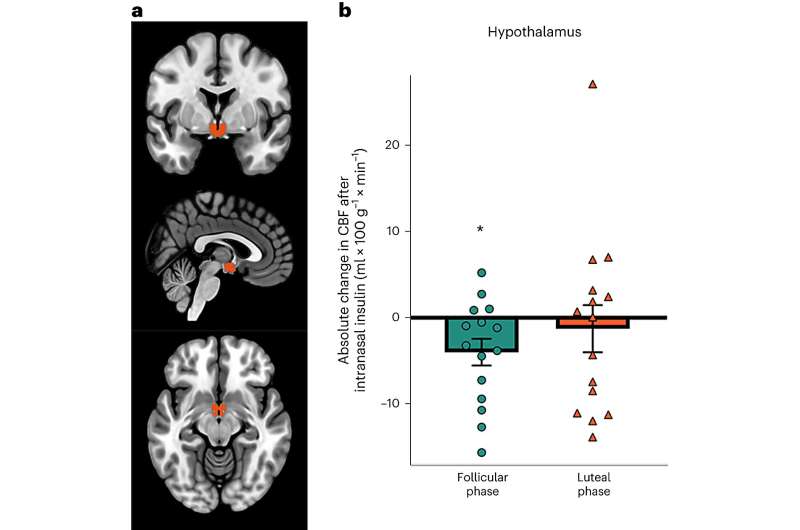September 22, 2023 report
This article has been reviewed according to Science X's editorial process and policies. Editors have highlighted the following attributes while ensuring the content's credibility:
fact-checked
peer-reviewed publication
trusted source
proofread
Brain sensitivity to insulin may be modulated by menstrual cycle

A combined team of diabetes specialists from Eberhard Karls University Tübingen and Heinrich Heine University Düsseldorf, both in Germany, has found evidence that suggests brain sensitivity to insulin may be modulated by the menstrual cycle in women.
In their study, reported in the journal Nature Metabolism, the group conducted a clinical trial involving monitoring the insulin levels of female volunteers. Nils Kroemer, with the University of Bonn, has published a News & Views piece in the same journal issue outlining the work done by the group on this new effort.
Prior research has suggested that the presence of insulin in the brain can lead to changes in eating behavior, whole-body metabolism and fat storage. How this works is not well understood. Making things even murkier, as the researchers note, is that virtually all prior research in this area has involved testing the impact of insulin on the brains of men.
In this new effort, the research team sought to learn more about the impact of insulin on women's brains. To that end, they conducted a clinical trial that involved testing the impact of insulin on the brains of 11 female volunteers during two time periods; during their first day of ovulation, and just after they had ovulated.
To measure the impact of insulin on their brains, the volunteers underwent hyperinsulinemic-euglycemic clamps—a procedure that can be used to measure insulin sensitivity. Some of the women were also given intranasal insulin doses during the procedure while others received a placebo. The researchers found that during the first day of ovulation, the brain was more sensitive to the insulin, but not during the days just after ovulation.
Next, the research team administered MRI scans to 15 different female volunteers to learn more about the impact of insulin on the hypothalamus during menstrual cycles. They found the same results—the women exhibited higher hypothalamus sensitivity to insulin just prior to the onset of ovulation but not afterward.
The researchers suggest their findings explain why so many women experience hunger just prior to getting their period, why their metabolism slows and why weight gain is so much more likely. Kroemer suggests that the female body reacts this way as a means of storing up energy to sustain a pregnancy, should it occur.
More information: Julia Hummel et al, Brain insulin action on peripheral insulin sensitivity in women depends on menstrual cycle phase, Nature Metabolism (2023). DOI: 10.1038/s42255-023-00869-w
Nils B. Kroemer, Metabolic tuning during the menstrual cycle, Nature Metabolism (2023). DOI: 10.1038/s42255-023-00867-y
© 2023 Science X Network




















